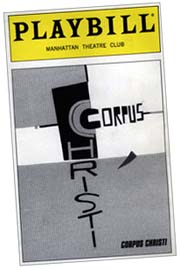Jesus H. Christ!
Corpus Christi takes the principle of artistic expression in vain.

The most electric moments in Corpus Christi, Terrence McNally's play about a gay Jesus, come when you arrive at the theater. Across the street, Catholic protestors in white berets recite Hail Marys into a megaphone. If you approach the police barricade that pens them in, they ply you with leaflets charging that the play portrays "the Blessed Virgin screaming obscenely to St. Joseph for sexual relations" (sadly, it doesn't). Thanks to the controversy, the entire run at the 299 seat Manhattan Theatre Club is sold out. Should you manage to lay hands on a ticket, you have to run a gauntlet of burly security guards and pass through an airport metal detector to get to your seat.
The experience is disorienting--part First Amendment vigil, part X-rated movie. Corpus Christi became instantaneously notorious in May, when the New York Post revealed that it depicted a Jesus who has sex with his apostles. After receiving telephone calls threatening violence, the Manhattan Theatre Club canceled the production. But the play was reinstated a week later amid protests from nearly every important dramatist in America and many elsewhere. Since restoring the play, the Manhattan Theatre Club has been congratulating itself on its fearless defense of free expression.
What a letdown, then, to finally see Corpus Christi and encounter neither blasphemy nor artistic courage. On the first score, the play comes up short. It is not, in fact, a work of savage (or even mild) anti-clericalism, in the tradition of the Marquis de Sade (whose every third scene involves priests and nuns performing unspeakable acts) or the films of Luis Buñuel (most famously Viridiana, with its infamous parody of the Last Supper tableau). There's no nudity or sex onstage, and though the Vatican regards the notion of a noncelibate gay Jesus as heretical, the playwright's intention is not sacrilegious. McNally's updating of the life of Jesus is much in the spirit of Godspell--if slightly more risqué. But while there's nothing very shocking about Corpus Christi, its dramatic and intellectual thinness is stunning. McNally's real offense is invoking a great theme and an all-important principle for something as trite and banal as this.
The play is in essence a gay retelling of the Gospel. Thirteen male actors perform a variety of parts in a series of sketches. In the first, Joshua, a k a Jesus, is born in a sleazy East Texas motel room (the woman screaming for sex is on the other side of a thin wall). At 1950s-era "Pontius Pilate High" in Corpus Christi, Texas--the town where McNally grew up--Joshua is bullied into playing football and taunted by his peers as a "faggot." An encounter in the school bathroom leads to an affair with a sinister classmate named Judas. After graduation, Joshua hitchhikes across the desert and has occasional conversations with his dad, God. He performs miracles and gathers disciples. One is a doctor, another an actor, another a male prostitute. They go to gay discos and spread the Word. Joshua performs a marriage for two of the apostles. After a scrumptious Last Supper, Judas betrays him with a French kiss. On the cross, Joshua is mocked as "King of the Queers."

T he staging and performances are competent, if uninspired. The real limitations are those of the writer, whose hallmarks are weak sophomoric humor and a cloying sentimentality. It's a gag line in this play when someone exclaims "Jesus H. Christ!" Joseph opposes naming his son Jesus, because people will thing he's a Mexican. "I hear hammering," Jesus tells his mother. "Of course you do," she says. "Your father's a carpenter." This is silly, and not really funny, but the intent is not to ridicule. The spirit is rather one of camp reverence. McNally, who was raised a Catholic, apparently considers himself in sympathy with the deeper meaning of Christianity, which he boils down to an injunction to be nice to everybody. His setting is supposed to teach us that Jesus loves gay people, too. Lest anyone miss the point, one of the apostles appears onstage to explain it to the audience after the crucifixion. "If we have offended, so be it," he declares. "He belongs to us as well as you."
This is weak Christian tea. Equally pallid is McNally's stereotyped portrayal of gay people. Like many of his other plays, Corpus Christi seems like ethnic PR, in the vein of Fiddler on the Roof or the movie Moonstruck. McNally wants to present homosexuals to heterosexuals as witty and wonderful. Though his gay characters aren't always perfect, the overall picture is of a delightful bunch of fellas. Gay men have flair, taste, and humor. They love Callas and cooking. They are sensitive and deep.
W here McNally fails time and again is by drawing gay people as types rather than complex characters. Watch the clip from the film version of Frankie and Johnny, for which McNally wrote the screenplay based on his own theater play. Michelle Pfeiffer's gay next-door neighbor, played by Nathan Lane, is a cut-up, whose jokes are usually variations of the theme of being a man who likes other men. In another McNally play-turned-film, the maudlin soap opera Love! Valour! Compassion!, Jason Alexander minces around, puts on women's clothes, and continually bursts into show tunes. Watch as he riffs on those annoying heterosexuals. In Corpus Christi, the disciple characters are thinly sketched versions of familiar clichés: the taciturn hairdresser, the buff male hustler, the yuppie lawyer. This may be Bethlehem, but it's still The Birdcage.
By focusing on the fact that the play portrays a Christ who has sex with his disciples, the press has encouraged a misconception about McNally's work. Most people now assume that Corpus Christi is an expression of ACT-UP-style radicalism--the theater of queer outrage performed with an NEA grant. But McNally wants to enlarge the bourgeoisie, not épater it. Corpus Christi, like his other plays, is a work of unchallenging, middlebrow subscription theater on a touchy theme. Of course, there's nothing wrong with middlebrow theater if done well. Neil Simon has his place. But Neil Simon doesn't congratulate his audience for being brave enough to laugh at his jokes. And Neil Simon can be funny.
The producers of the play, basking in the glow of First Amendment martyrdom, have not done much to clear up the misunderstanding. During last spring's controversy, McNally's agent Gilbert Parker was quoted complaining that no journalist had bothered to request a copy of the script of Corpus Christi. When I called to ask for one, Parker's office told me that it wasn't releasing it. I don't think the playwright or the theater wants people to know that the play is largely inoffensive. The frisson of blasphemy has resulted in an overflowing house. But were the Philistines at the barricades allowed inside, I fear they would find little to stoke their fury--or hold their interest.
